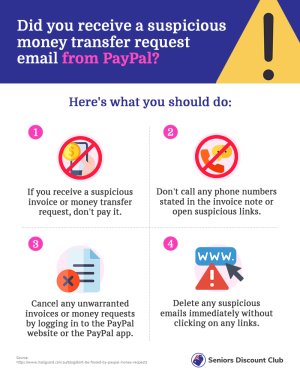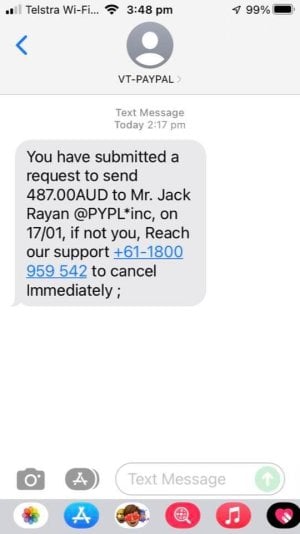PayPal users, are you aware of this new money transfer request scam? Here's what you need to know
- Replies 21
It's no exaggeration to say that nowadays, many of us can hardly bear to imagine a life without digital payments.
Forget about carrying around cash and counting out coins, this wildly popular payment option makes it easy to transfer and receive money virtually anywhere in the world, in just a few clicks.
PayPal is one of the most popular payment platforms out there, and it has become an integrated part of many Aussies' online shopping experiences.
It allows us to pay with simple one-click ease instead of clunky credit cards—all the while safe in the knowledge that we can rely on PayPal's Purchase Protection program to be there in case of fraud or scams.
But that doesn't mean PayPal is immune to scammers. In fact, with more than 430 million users, this user base makes it the perfect target for scams.
And scammers have plenty of ways to attempt to exploit it. But the one we’re focussing on today is the money request feature.
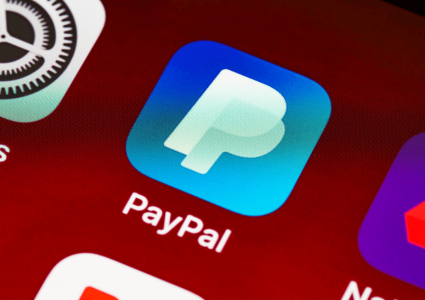
The thought of someone trying to make away with your hard-earned savings just doesn't sit well with us. So, to make sure you're aware of this new scam, as well as what to do should you come in contact with it, let's delve a little deeper...
According to Australian email security company MailGuard, this 'sophisticated' new scam works by sending a money transfer request to a number of people, in the hope that someone will blindly approve it.
Scammers typically use different reasons in each request they send, but they usually urge the receiver to transfer hundreds of dollars to them, and even provide a phone number to contact in order to feign authenticity.
Even though PayPal has placed restrictions on sending money requests to make sure the user on the receiving end is registered as the sender's family or friend in order to protect users, scammers have found a way to work around this security measure.
How? By using compromised Office 365 accounts to create secondary profiles that are linked to the primary account as 'friends'. This then makes it possible for them to redirect PayPal emails to a list of known users with PayPal accounts.
What's more, the emails sent usually carry the label 'This message is from a trusted sender', making a con job look legitimate to the untrained eye.
As seen in the example below, the 'To' address displays as 'member12(at)(subdomain)(dot)onmicrosoft(dot)com'.
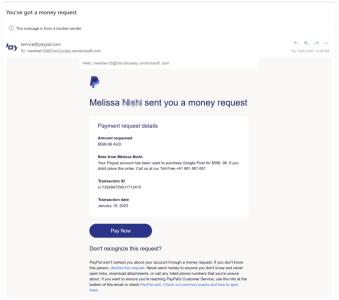
So, what should you do if you ever receive a suspicious request?
PayPal is aware of this scam, and its representatives recommend not responding to the request and reporting it as soon as possible.
If someone calls you and is threatening action if you don't pay, be cautious and don't provide any further payment details.
Also, please remember that PayPal's Purchase Protection Program doesn't extend to Family and Friends transactions, so if someone requests a payment from you through this method, cancel it as soon as possible.
It's also important to be extra vigilant when browsing online marketplaces such as eBay, Gumtree, Trading Post, or Facebook, and always double-check the source of any requests you receive.
Lastly, if you've already transferred funds, contact PayPal and have the payment request cancelled too.

When it comes to scams like this, the best defence is knowledge. Knowing the signs to look out for and the safety features to activate when using online payment platforms can help protect users from fraudulent activity.
PayPal, for example, offers a number of recognised security features to protect users' accounts and data. These include two-factor authentication, extended protection to cover unauthorised transactions, and email and text notifications for transactions.
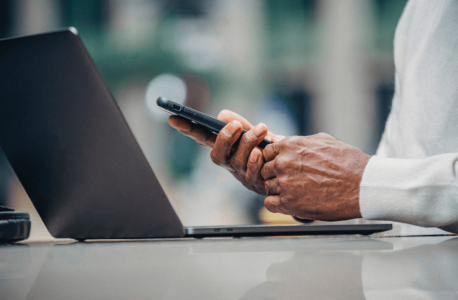
Enabling two-factor authentication is recommended for all online accounts for maximum security. This requires users to provide an extra layer of authentication - usually either a code sent to an email address or mobile phone, or a biometric verification such as a fingerprint - when they log in to their account.
It's also important to regularly monitor your accounts for any suspicious activity. In the event of suspicious activity, contact your financial institution immediately or contact PayPal's customer service hotline at 1800 073 263 or +61 2 8223 9500.
PayPal also provides users with access to confidential information with the help of encrypted communication. Any contact with the PayPal team is made through its support website or via the customer service hotline, which ensures a safe and secure transaction for all parties involved.
Finally, ensure that your payment information is up to date and that your contact information is correct. PayPal offers its users the ability to update their payment information as needed and make sure their contact information is always up to date.
By following these strategies, users can feel safe knowing that their personal information is secure. It also enables them to monitor their accounts more closely for any suspicious activity and react quickly if needed.
As you may already be aware, it's important to exercise caution when using the internet, especially when it comes to your accounts and finances.
To stay safe, we encourage you to avoid clicking on any links that seem suspicious and to always thoroughly research before making any transfers.
If you are a frequent PayPal user, we would love to hear about your experiences. Have you come across this scam recently? Please share your thoughts in the comments section below. We appreciate your input!
Forget about carrying around cash and counting out coins, this wildly popular payment option makes it easy to transfer and receive money virtually anywhere in the world, in just a few clicks.
PayPal is one of the most popular payment platforms out there, and it has become an integrated part of many Aussies' online shopping experiences.
It allows us to pay with simple one-click ease instead of clunky credit cards—all the while safe in the knowledge that we can rely on PayPal's Purchase Protection program to be there in case of fraud or scams.
But that doesn't mean PayPal is immune to scammers. In fact, with more than 430 million users, this user base makes it the perfect target for scams.
And scammers have plenty of ways to attempt to exploit it. But the one we’re focussing on today is the money request feature.

If you've ever sent or received money on PayPal, then you may need to be aware of a new scam that's currently circulating. Credit: Brett Jordan.
The thought of someone trying to make away with your hard-earned savings just doesn't sit well with us. So, to make sure you're aware of this new scam, as well as what to do should you come in contact with it, let's delve a little deeper...
According to Australian email security company MailGuard, this 'sophisticated' new scam works by sending a money transfer request to a number of people, in the hope that someone will blindly approve it.
Scammers typically use different reasons in each request they send, but they usually urge the receiver to transfer hundreds of dollars to them, and even provide a phone number to contact in order to feign authenticity.
Even though PayPal has placed restrictions on sending money requests to make sure the user on the receiving end is registered as the sender's family or friend in order to protect users, scammers have found a way to work around this security measure.
How? By using compromised Office 365 accounts to create secondary profiles that are linked to the primary account as 'friends'. This then makes it possible for them to redirect PayPal emails to a list of known users with PayPal accounts.
What's more, the emails sent usually carry the label 'This message is from a trusted sender', making a con job look legitimate to the untrained eye.
As seen in the example below, the 'To' address displays as 'member12(at)(subdomain)(dot)onmicrosoft(dot)com'.

Scammers are using compromised accounts of real users, rather than creating fake ones. Credit: MailGuard.
So, what should you do if you ever receive a suspicious request?
PayPal is aware of this scam, and its representatives recommend not responding to the request and reporting it as soon as possible.
If someone calls you and is threatening action if you don't pay, be cautious and don't provide any further payment details.
Also, please remember that PayPal's Purchase Protection Program doesn't extend to Family and Friends transactions, so if someone requests a payment from you through this method, cancel it as soon as possible.
It's also important to be extra vigilant when browsing online marketplaces such as eBay, Gumtree, Trading Post, or Facebook, and always double-check the source of any requests you receive.
Lastly, if you've already transferred funds, contact PayPal and have the payment request cancelled too.
Key Takeaways
- PayPal is one of the most popular payment platforms and is often the target of different types of scams.
- There is a new PayPal scam to be aware of, where scammers use the money transfer request feature to target users.
- This scam bypasses PayPal's security measures by using compromised Office 365 accounts to create second profiles for the primary account.
- PayPal advises recipients of suspicious invoices or money requests to not pay and to delete these emails immediately.
PayPal, for example, offers a number of recognised security features to protect users' accounts and data. These include two-factor authentication, extended protection to cover unauthorised transactions, and email and text notifications for transactions.

Remember to think twice and do your research before transferring your money over the internet. Credit: Ono Kosuki.
Enabling two-factor authentication is recommended for all online accounts for maximum security. This requires users to provide an extra layer of authentication - usually either a code sent to an email address or mobile phone, or a biometric verification such as a fingerprint - when they log in to their account.
It's also important to regularly monitor your accounts for any suspicious activity. In the event of suspicious activity, contact your financial institution immediately or contact PayPal's customer service hotline at 1800 073 263 or +61 2 8223 9500.
PayPal also provides users with access to confidential information with the help of encrypted communication. Any contact with the PayPal team is made through its support website or via the customer service hotline, which ensures a safe and secure transaction for all parties involved.
Finally, ensure that your payment information is up to date and that your contact information is correct. PayPal offers its users the ability to update their payment information as needed and make sure their contact information is always up to date.
By following these strategies, users can feel safe knowing that their personal information is secure. It also enables them to monitor their accounts more closely for any suspicious activity and react quickly if needed.
As you may already be aware, it's important to exercise caution when using the internet, especially when it comes to your accounts and finances.
To stay safe, we encourage you to avoid clicking on any links that seem suspicious and to always thoroughly research before making any transfers.
If you are a frequent PayPal user, we would love to hear about your experiences. Have you come across this scam recently? Please share your thoughts in the comments section below. We appreciate your input!

